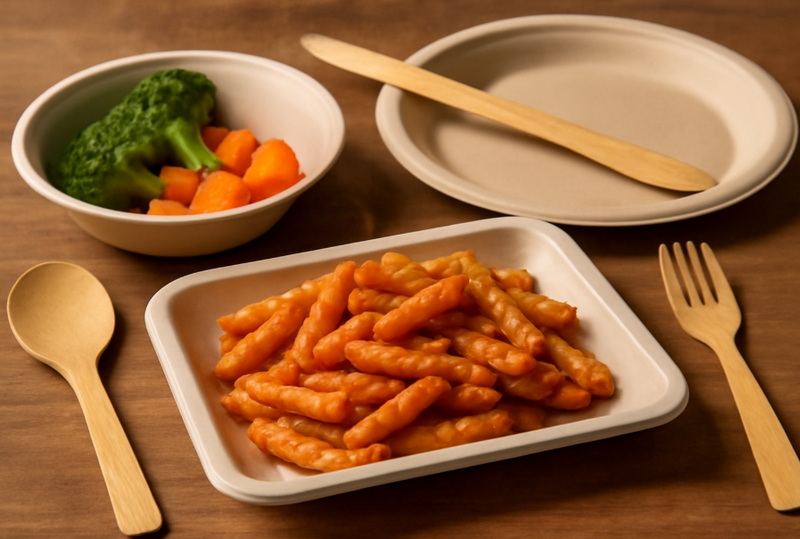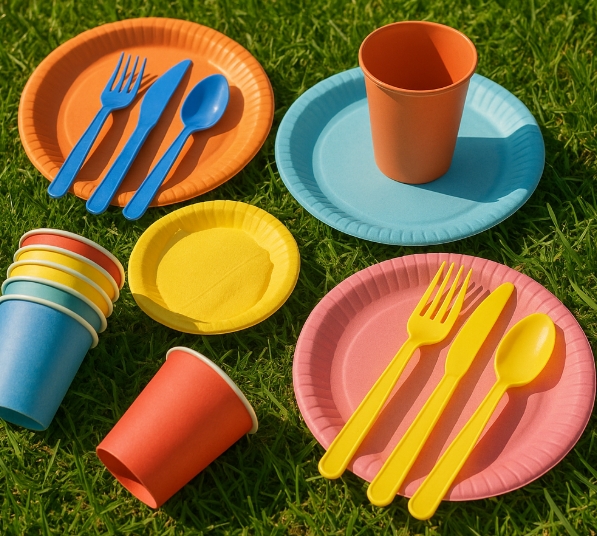
Content Menu
● Market Overview
● Key Trends in the UK Disposable Cutlery Market
>> 1. Sustainability and Eco-Friendly Materials
>> 2. Innovation in Manufacturing
>> 3. OEM and Private Label Services
>> 4. Regulatory Compliance and Certifications
>> 5. Expansion of Product Ranges
● Top Disposable Cutlery Manufacturers And Suppliers in the UK
>> Vegware Ltd.
>> Biopac UK Ltd.
>> Plastico Limited
>> Other Notable Manufacturers and Suppliers
● Manufacturing Processes: From Plastic to Bamboo
>> Plastic Cutlery Production
>> Wooden and Bamboo Cutlery Production
>> Quality Control and Packaging
● Sustainability and Regulatory Landscape
● OEM and Private Label Opportunities
● How to Choose the Right Disposable Cutlery Supplier
● Conclusion
● Frequently Asked Questions
>> 1. What are the main materials used by UK Disposable Cutlery Manufacturers And Suppliers?
>> 2. How do UK regulations impact the disposable cutlery market?
>> 3. Can I order custom-branded disposable cutlery from UK suppliers?
>> 4. What are the benefits of choosing biodegradable cutlery?
>> 5. How can I ensure the quality of disposable cutlery from UK suppliers?
The United Kingdom is a leader in the global disposable cutlery industry, driven by innovation, sustainability, and a commitment to quality. As the demand for convenient, hygienic, and eco-friendly foodservice solutions grows, the role of Disposable Cutlery Manufacturers And Suppliers becomes increasingly vital. This article explores the leading companies, market trends, manufacturing processes, and the future of disposable cutlery in the UK, providing valuable insights for international brand owners, wholesalers, and OEM partners seeking reliable suppliers.

Market Overview
The UK disposable cutlery market is experiencing robust growth, fueled by the increasing demand for convenience, hygiene, and sustainability in foodservice and hospitality sectors. The market is characterized by a shift towards biodegradable and compostable materials, driven by regulatory changes and consumer preferences for eco-friendly products.
Key Market Highlights:
- The UK market is moving towards concentration, with a Herfindahl index (HHI) of 3377 in 2023, indicating fewer but larger players dominating the market.
- Biodegradable materials such as PLA (polylactic acid), bamboo, and birchwood are gaining popularity due to environmental regulations and consumer demand.
- The foodservice, hospitality, and retail sectors are the primary drivers of disposable cutlery demand in the UK.
Key Trends in the UK Disposable Cutlery Market
1. Sustainability and Eco-Friendly Materials
With the UK government banning single-use plastic cutlery and plates, manufacturers are rapidly innovating with biodegradable alternatives such as wood, bamboo, and paper-based cutlery. This shift is not only regulatory-driven but also reflects a broader consumer movement towards sustainable living. Companies are investing in research and development to create products that are not only functional but also environmentally responsible.
2. Innovation in Manufacturing
Manufacturers are investing in advanced production technologies to improve efficiency, reduce waste, and enhance product quality. Automation, injection molding, and thermoforming are widely used for plastic cutlery, while CNC carving and hot pressing are common in wooden and bamboo cutlery production. These innovations help manufacturers meet the growing demand for high-quality, sustainable products while maintaining competitive pricing.
3. OEM and Private Label Services
Many UK Disposable Cutlery Manufacturers And Suppliers offer OEM and private label services, catering to international brands, wholesalers, and distributors seeking customized solutions and branding opportunities. This trend allows businesses to differentiate themselves in a crowded market and meet specific customer requirements.
4. Regulatory Compliance and Certifications
Compliance with UK and EU regulations is a top priority for manufacturers. Certifications such as FSC (Forest Stewardship Council), BRC (British Retail Consortium), and ISO standards are increasingly important for demonstrating product quality and sustainability. These certifications provide assurance to customers and help manufacturers access new markets.
5. Expansion of Product Ranges
Manufacturers are expanding their product ranges to include not only traditional cutlery items like forks, knives, and spoons but also specialty items such as stirrers, chopsticks, and serving utensils. This diversification helps companies meet the evolving needs of the foodservice industry and capture new business opportunities.
Top Disposable Cutlery Manufacturers And Suppliers in the UK
Vegware Ltd.
Overview:
Vegware is a leading UK manufacturer specializing in plant-based, compostable catering disposables. Founded in Edinburgh in 2006, Vegware has grown into a global brand, supplying over 70 countries with eco-friendly foodservice packaging.
Key Features:
- Products made from renewable, lower-carbon, reclaimed, or recycled materials.
- Designed for commercial composting with food waste.
- Award-winning company with a strong focus on sustainability and innovation.
- Offers a wide range of cutlery, cups, plates, and packaging solutions.
OEM Capabilities:
Vegware provides custom printing and private label services, making it a preferred partner for international brands seeking sustainable solutions.
Biopac UK Ltd.
Overview:
Biopac UK Ltd. is recognized as a pioneer in environmentally responsible packaging and catering disposables. The company focuses on developing biodegradable and compostable products for the foodservice industry.
Key Features:
- Wide range of eco-friendly disposable cutlery, including wooden, bamboo, and compostable plastic options.
- Strong commitment to research and development in sustainable materials.
- Supplies to major foodservice chains, wholesalers, and retailers.
OEM Capabilities:
Biopac offers tailored solutions for private label and OEM clients, supporting international expansion and brand differentiation.
Plastico Limited
Overview:
Plastico Limited is a well-established British manufacturer of plastic tableware, including disposable cutlery, meal packs, and drinkware. Based in South London, Plastico serves customers across the UK and Europe.
Key Features:
- Specializes in injection-molded plastic cutlery and tableware.
- Offers both traditional and sustainable product lines.
- Provides a "one-stop shop" for foodservice disposables.
OEM Capabilities:
Plastico supports custom product development and branding for OEM and private label clients, ensuring flexibility and scalability.
Other Notable Manufacturers and Suppliers
- Streetfood Packaging: Leading supplier of eco-friendly, biodegradable, and recyclable disposable cutlery for the UK market.
- IG Group UK: Offers a variety of sustainable cutlery options, including birchwood, paper, and bamboo utensils.
- Jenpak Ltd: Major importer and supplier of upscale disposable catering and packaging products.
- B&P Wholesale: Family-run business with over 40 years of experience supplying disposable cutlery to the UK trade.
- GM Packaging: Specializes in wooden and eco-friendly cutlery for catering and retail.
- MX Wholesale: Pound shop supplier offering a wide range of disposable cutlery at competitive prices.

Manufacturing Processes: From Plastic to Bamboo
Plastic Cutlery Production
Plastic cutlery is typically produced using injection molding or thermoforming processes. Polystyrene or polypropylene pellets are melted, colored, and injected into molds to form forks, knives, and spoons. Automation ensures high efficiency and consistent quality. The process allows for mass production, making plastic cutlery a cost-effective option for many businesses. However, due to environmental concerns, the industry is shifting towards more sustainable alternatives.
Wooden and Bamboo Cutlery Production
Wooden and bamboo cutlery manufacturing involves several steps, including wood selection, cutting, boiling, shaping, drying, and polishing. Advanced CNC machines and hot pressing techniques are used to create ergonomic and durable utensils. Bamboo, in particular, is valued for its rapid growth and renewability, making it an excellent choice for eco-friendly cutlery. The finished products are biodegradable and compostable, aligning with the UK's sustainability goals.
Quality Control and Packaging
Quality control is a critical aspect of the manufacturing process. Manufacturers implement rigorous testing procedures to ensure that products meet food safety standards and customer expectations. Packaging is also evolving, with a focus on recyclable and compostable materials to further reduce environmental impact.
Sustainability and Regulatory Landscape
The UK government has implemented strict regulations to reduce plastic waste, including bans on single-use plastic cutlery and incentives for biodegradable alternatives. Manufacturers are responding by investing in sustainable materials and circular economy initiatives.
Key Regulatory Points:
- Ban on single-use plastic cutlery, plates, and other items.
- Promotion of compostable and recyclable materials.
- Support for waste reduction and environmental stewardship.
Alternatives to Plastic:
- Wooden Cutlery: Biodegradable, compostable, and popular for its natural look and feel.
- Paper Cutlery: Lightweight, robust, and commercially compostable.
- Bagasse Packaging: Made from recycled sugarcane fiber, ideal for hot and cold foods.
OEM and Private Label Opportunities
For international brand owners, wholesalers, and producers, partnering with UK Disposable Cutlery Manufacturers And Suppliers offers several advantages:
- Customization: Tailored product designs, branding, and packaging.
- Quality Assurance: Compliance with UK and EU standards for food safety and sustainability.
- Supply Chain Efficiency: Reliable logistics and support for global distribution.
- Innovation: Access to the latest materials and manufacturing technologies.
Chinese factories, like ours, can collaborate with UK partners to provide cost-effective OEM solutions, leveraging advanced production capabilities and competitive pricing. This partnership model enables both parties to benefit from shared expertise and expanded market reach.
How to Choose the Right Disposable Cutlery Supplier
When selecting a Disposable Cutlery Manufacturer And Supplier in the UK, consider the following factors:
- Product Range: Ensure the supplier offers a variety of materials (plastic, wood, bamboo, paper) and product types.
- Sustainability Credentials: Look for certifications such as FSC, BRC, and compliance with UK regulations.
- OEM/Private Label Services: Assess the supplier's ability to provide customized solutions.
- Production Capacity: Confirm the supplier can meet your volume requirements and delivery timelines.
- Reputation and Experience: Choose established companies with a proven track record in the industry.
- Customer Support: Evaluate the supplier's responsiveness and willingness to address your specific needs.
Conclusion
The UK disposable cutlery market is evolving rapidly, driven by sustainability, innovation, and regulatory changes. Leading Disposable Cutlery Manufacturers And Suppliers are embracing eco-friendly materials, advanced manufacturing processes, and OEM/private label services to meet the diverse needs of international clients. By understanding market trends, regulatory requirements, and supplier capabilities, businesses can make informed decisions and build successful partnerships in the UK disposable cutlery industry.

Frequently Asked Questions
1. What are the main materials used by UK Disposable Cutlery Manufacturers And Suppliers?
UK manufacturers use a range of materials, including biodegradable plastics (PLA), wood, bamboo, and paper. The shift towards eco-friendly materials is driven by regulatory changes and consumer demand for sustainable products.
2. How do UK regulations impact the disposable cutlery market?
The UK government has banned single-use plastic cutlery and encourages the use of biodegradable alternatives. Manufacturers must comply with these regulations, which has accelerated innovation in sustainable materials and production processes.
3. Can I order custom-branded disposable cutlery from UK suppliers?
Yes, many UK Disposable Cutlery Manufacturers And Suppliers offer OEM and private label services, allowing you to customize product design, branding, and packaging to suit your business needs.
4. What are the benefits of choosing biodegradable cutlery?
Biodegradable cutlery reduces environmental impact, supports waste reduction initiatives, and aligns with consumer preferences for sustainable products. It also helps businesses comply with regulatory requirements and enhance their brand image.
5. How can I ensure the quality of disposable cutlery from UK suppliers?
Look for suppliers with recognized certifications (e.g., FSC, BRC), a strong reputation, and transparent quality assurance processes. Request product samples and verify compliance with food safety and sustainability standards before placing large orders.

















